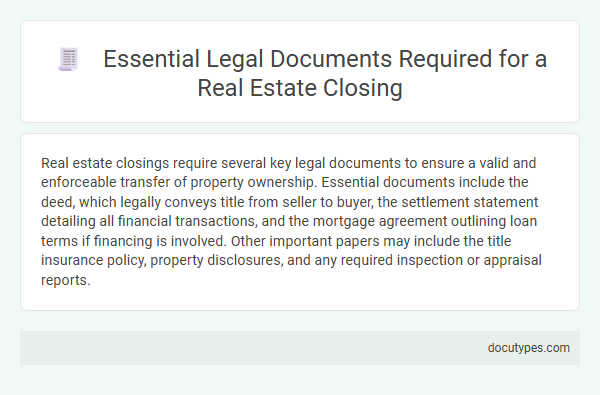Real estate closings require several key legal documents to ensure a valid and enforceable transfer of property ownership. Essential documents include the deed, which legally conveys title from seller to buyer, the settlement statement detailing all financial transactions, and the mortgage agreement outlining loan terms if financing is involved. Other important papers may include the title insurance policy, property disclosures, and any required inspection or appraisal reports.
Introduction to Real Estate Closing
Real estate closing is the final step in a property transaction where ownership is legally transferred from seller to buyer. This process involves several key legal documents that ensure the transaction is secure and binding.
Essential documents include the deed, which proves ownership of the property, and the title report, confirming that the title is clear of liens or encumbrances. The settlement statement outlines all financial details, including purchase price and closing costs. Loan documents, if applicable, finalize the buyer's mortgage agreement with the lender.
Importance of Legal Documentation
Legal documentation is essential in real estate closings to ensure all parties' rights and obligations are clearly defined and protected. Properly executed documents prevent future disputes and facilitate a smooth transfer of property ownership.
- Deed - Transfers ownership from the seller to the buyer and must meet state-specific legal requirements to be valid.
- Title Report - Confirms the seller's legal ownership and reveals any liens or encumbrances affecting the property.
- Closing Statement - Details the financial transactions, including costs, fees, and funds distribution, ensuring transparency for all parties.
Purchase Agreement
The Purchase Agreement is a crucial legal document required for a real estate closing. It outlines the terms and conditions agreed upon by the buyer and seller.
- Contract Terms - The Purchase Agreement specifies the price, payment method, and closing date.
- Contingencies - It includes conditions such as inspections, financing approval, and property appraisal.
- Legal Binding - This document legally binds both parties to fulfill their obligations for the transaction to proceed.
Title Deed and Title Search
| Legal Document | Description | Importance in Real Estate Closing |
|---|---|---|
| Title Deed | Official document that proves ownership of the property. It contains details such as owner's name, property boundaries, and any legal descriptions. | Essential for transferring ownership from seller to buyer. The title deed verifies the seller's right to sell the property and provides the buyer legal proof of ownership after closing. |
| Title Search | Comprehensive examination of public records and historical documents related to the property's title. This search identifies any liens, encumbrances, or disputes. | Crucial step to ensure clear ownership and to avoid future legal complications. It confirms that the title deed is free from defects, claims, or legal issues before closing the transaction. |
Mortgage Documents
Mortgage documents are essential legal papers required for a real estate closing. Key mortgage documents include the promissory note, deed of trust or mortgage agreement, and the Closing Disclosure. These documents outline the loan terms, secure the lender's interest in the property, and provide a detailed account of the financial transaction.
Closing Disclosure Statement
The Closing Disclosure Statement is a crucial legal document required for a real estate closing. It outlines the final terms of the mortgage, including loan terms, closing costs, and the amount you need to bring to the closing table. This document ensures transparency and protects your interests by providing a detailed summary of all financial aspects involved in the property transaction.
Bill of Sale
The Bill of Sale is a crucial legal document in a real estate closing that transfers ownership of personal property from the seller to the buyer. It provides a detailed description of the items included in the sale, ensuring clear title transfer.
This document protects both parties by serving as proof of purchase and a record of the transaction. A properly executed Bill of Sale can help prevent disputes over ownership of fixtures or appliances included in the property sale.
Homeowners’ Insurance Proof
Homeowners' insurance proof is a critical legal document required during a real estate closing. It ensures that the property is protected against potential damages from the moment you take ownership.
- Proof of Coverage - This document verifies that your homeowners' insurance policy is active and meets lender requirements.
- Policy Details - It includes coverage limits, deductibles, and insured risks, confirming adequate protection for the property.
- Lender Requirement - Most mortgage lenders mandate homeowners' insurance proof to minimize financial risk on the loan.
Providing valid homeowners' insurance proof is essential to complete your real estate closing successfully.
Settlement Statement (HUD-1)
During a real estate closing, several key legal documents are required to finalize the transaction. One of the most important documents is the Settlement Statement, commonly known as the HUD-1.
The HUD-1 outlines all the financial details of the transaction, including buyer and seller costs. It provides a clear summary of fees, taxes, and payments to be made during the closing process.
What Legal Documents Are Required for a Real Estate Closing? Infographic

